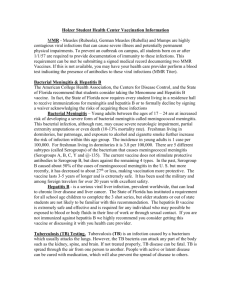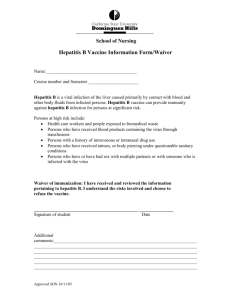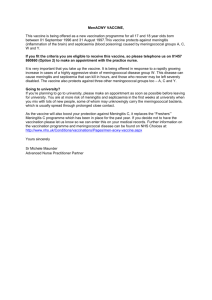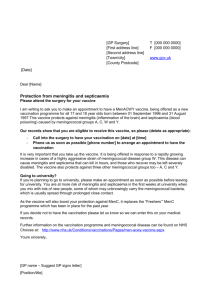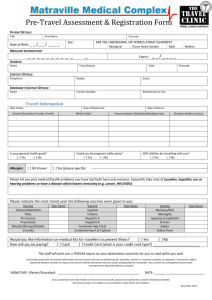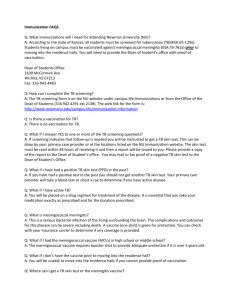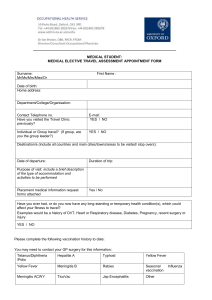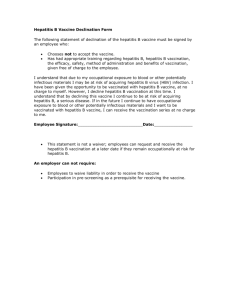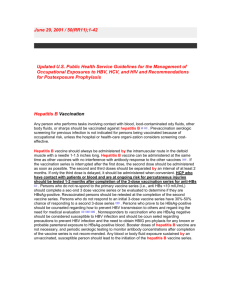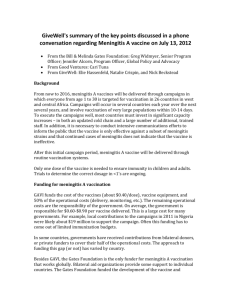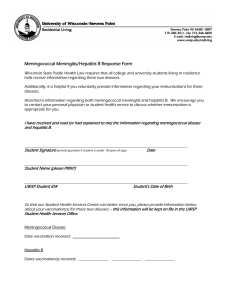Holzer Health Center Vaccination Information
advertisement
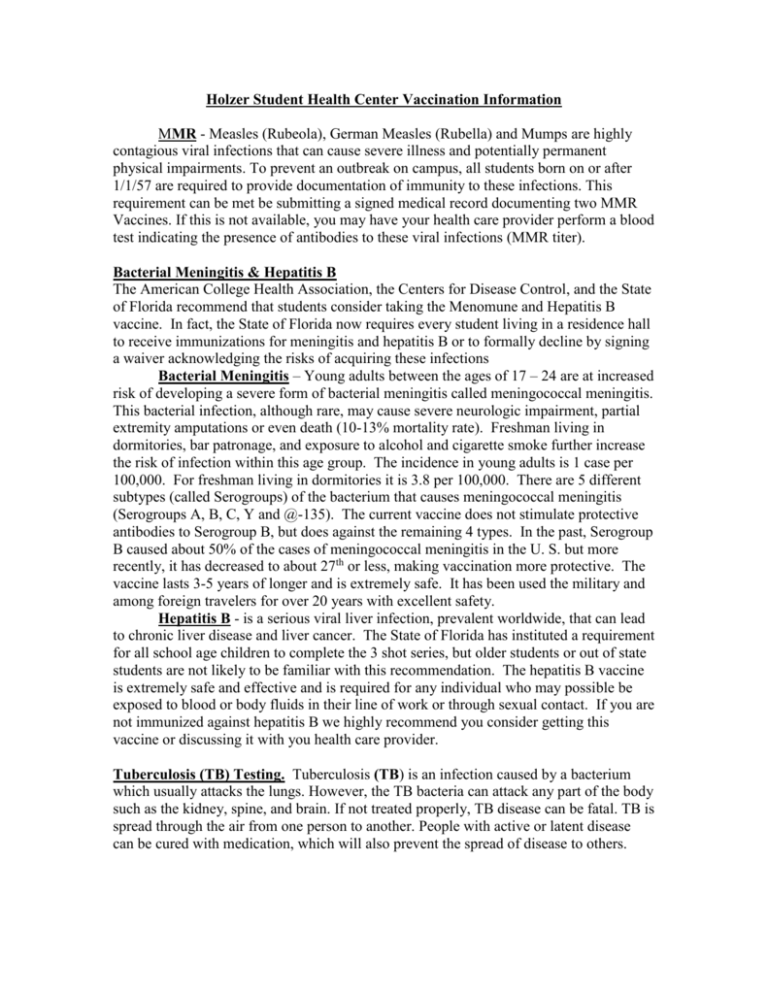
Holzer Student Health Center Vaccination Information MMR - Measles (Rubeola), German Measles (Rubella) and Mumps are highly contagious viral infections that can cause severe illness and potentially permanent physical impairments. To prevent an outbreak on campus, all students born on or after 1/1/57 are required to provide documentation of immunity to these infections. This requirement can be met be submitting a signed medical record documenting two MMR Vaccines. If this is not available, you may have your health care provider perform a blood test indicating the presence of antibodies to these viral infections (MMR titer). Bacterial Meningitis & Hepatitis B The American College Health Association, the Centers for Disease Control, and the State of Florida recommend that students consider taking the Menomune and Hepatitis B vaccine. In fact, the State of Florida now requires every student living in a residence hall to receive immunizations for meningitis and hepatitis B or to formally decline by signing a waiver acknowledging the risks of acquiring these infections Bacterial Meningitis – Young adults between the ages of 17 – 24 are at increased risk of developing a severe form of bacterial meningitis called meningococcal meningitis. This bacterial infection, although rare, may cause severe neurologic impairment, partial extremity amputations or even death (10-13% mortality rate). Freshman living in dormitories, bar patronage, and exposure to alcohol and cigarette smoke further increase the risk of infection within this age group. The incidence in young adults is 1 case per 100,000. For freshman living in dormitories it is 3.8 per 100,000. There are 5 different subtypes (called Serogroups) of the bacterium that causes meningococcal meningitis (Serogroups A, B, C, Y and @-135). The current vaccine does not stimulate protective antibodies to Serogroup B, but does against the remaining 4 types. In the past, Serogroup B caused about 50% of the cases of meningococcal meningitis in the U. S. but more recently, it has decreased to about 27th or less, making vaccination more protective. The vaccine lasts 3-5 years of longer and is extremely safe. It has been used the military and among foreign travelers for over 20 years with excellent safety. Hepatitis B - is a serious viral liver infection, prevalent worldwide, that can lead to chronic liver disease and liver cancer. The State of Florida has instituted a requirement for all school age children to complete the 3 shot series, but older students or out of state students are not likely to be familiar with this recommendation. The hepatitis B vaccine is extremely safe and effective and is required for any individual who may possible be exposed to blood or body fluids in their line of work or through sexual contact. If you are not immunized against hepatitis B we highly recommend you consider getting this vaccine or discussing it with you health care provider. Tuberculosis (TB) Testing. Tuberculosis (TB) is an infection caused by a bacterium which usually attacks the lungs. However, the TB bacteria can attack any part of the body such as the kidney, spine, and brain. If not treated properly, TB disease can be fatal. TB is spread through the air from one person to another. People with active or latent disease can be cured with medication, which will also prevent the spread of disease to others. All students arriving from a TB endemic area will be required to have a TB skin test or a TB Blood Assay within three months of starting school. Please note that a history of BCG immunization does not negate the need for a skin test. The Student Health Center does not use skin test for TB Testing, only the T-Spot, an extremely accurate blood test and is not affected by a history of BCG vaccination or other interfering factors. The blood test does not require a second visit 48 to 72 hours later as a skin test does (many people forget to return and need to have the test done again, which requires a repeat payment as well.) For every positive skin test, a Chest X-Ray is needed to rule out active disease. If the Chest X-ray is negative, the patient will be counseled as to their risk factors and if medications are advised to treat the exposure to tuberculosis. Because the T-Spot (blood test) is so accurate, there are fewer false positive tests, thus reducing the exposure to radiation, the cost of a Chest X-ray and eliminating the recommendation to take antibiotic medication for 9 months as a precaution. ENDEMIC AREAS OF THE WORLD ARE CONSIDERED ANY AREA NOT LISTED BELOW: NORTH AMERICAN REGION: AMERICAN REGION USA, Canada, Jamaica, Saint Kitts and Nevis, Saint Lucia, Virgin Islands. EUROPEAN Belgium, Denmark, Finland, France, Germany, Greece, Iceland, Ireland, Italy, Liechtenstein, Luxembourg, Malta, Monaco, Netherlands, Norway, San Marino, Sweden, Switzerland, United Kingdom. WESTERN PACIFIC: American Samoa, Australia, New Zealand. Recommended Vaccines Tetanus - Tetanus is recommended every 10 years routinely or within 5 years for contaminated or deep puncture wounds. With the recent re-emergence of Pertusis, a lung infection, the pertussis vaccine was added to the Tetanus/ Diptheria vaccine. The CDC advises that all adolescents’ adults receive one dose of the TDAP to boost their immunity to pertussis when a tetanus shot is needed. Chicken Pox (Varicella) - Is a highly contagious viral infection that can cause high fever and a severely uncomfortable rash with potential scarring. It is not uncommon among college students who have not yet experienced this childhood illness or received the vaccine. Varicella vaccination is available and is highly recommended for all children, adolescents and young adults. It is given as a 2 shot series, 1 – 2 months apart. The vaccine is generally well tolerated; 3 – 5% may experience a mild, varicella-like rash or low-grade fever, but complications are rare. Hepatitis A – Is a viral illness that affects the liver; it is especially prevalent in developing countries and is most often transmitted via contaminated food and water. Numerous outbreaks occur throughout the United States and will likely continue and possibly increase in the next decade. Though not a cause of chronic liver disease, adults who develop hepatitis A can be extremely ill and lose significant school or work time during the course of an infection. The Hepatitis A vaccine is very safe and is given as a 2 shot series, 6 months apart. It is essential for anyone planning travel to developing countries, but may be a good investment in your health even in the U.S. Influenza – Yearly Flu shots are recommended for everyone, but are especially indicated for anyone with asthma, chronic heart or lung disease, diabetes or other health problems which compromise the ability to fight infections. Pneumovax, the “pneumonia vaccine,” may also be recommended for these same individuals. Preventing any of these diseases is highly desirable and is best accomplished with vaccination which can be obtained at the Student Health Center or your local health care provider Contact the Holzer Student Health Center for further information.
